The Spring 2010 Anime Preview Guide
Hope Chapman
Hope Chapman, film student, anime lover, and all-around big frellin' nerd, is happy to be joining the ANN crew for the Spring preview this year, even if that means returning to her kryptonite, Ikki Tousen, during a hectic semester. Living comfortably in the boonies of Kentucky and wishing it had more people in it, she extends her passion for anime analysis to video reviews along with more lighthearted visual fare featured at her home site d2brigade.net. She'll do anything to make an audience smile, but failing that, at least tries to pick out the best in the anime slushpile and share it with anyone curious about the medium. Side note: it's always easier to write with a kitty cat sitting on your back.
Rainbow
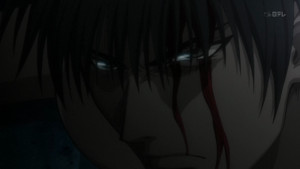
Rating: 4.5 (of 5)
This episode begins with a disclaimer from the production staff: “We believe that the explicit scenes of this animated work are rather important in bringing out the atmosphere of this time period.” The word “explicit” is indeed bolded…in red. Title aside, this is not going to be a bright and colorful affair.
What follows is not a string of graphic incidents, mind you, but a dismal, foreboding atmosphere overall that suggest this warning applies to the series on the whole and the worst is yet to come. This episode on its own is mature but not terribly gnarly. Taking place ten years after the loss of World War II, and assumedly based on true events, this story follows the lives of six juvenile delinquents convicted of various crimes and thrown into prison. Due to the severe poverty still afflicting the nation, crime is rampant, particularly among the youth, and little mercy is shown to even minor offenders. It seems the whole of society, as seen through the consternation of civilians on a bus used to transport the criminals, would rather off them than send them to prison…but they can at least be made to work. The small cell these six share is already occupied by a seventh youth, older and stronger than them, who begins to whip them into shape and assures them they will all get out some day.
The pace here is slow and deliberate and the palette grainy and dulled. Few words are exchanged; the narrator has more lines than any one character but still doesn't speak much, and very little is known about these boys on the whole apart from their names and the crimes they all committed, which range from assault to theft to, more tragically, underage drinking and “improper intergender relations.” Regardless, there's a deep humanity to this story already shining through in the first episode, whether through the pleading blue eyes of one prisoner seen through a smothering hood, or in the tears produced by the angriest inmate after he is offered a puff of the only cigarette they may ever have in the compound. Apart from a few obvious tropes and clichés in the cast, (abusive prison guard attacking large crybaby ahoy,) this is an engrossing introduction to what may be a disturbing story, but good art often disrupts.
Don't let the warning scare you away just yet, and violence junkies, don't tune in on the assumption that this is going to be a jolly good gorefest. This looks to be a sobering drama for mature audiences, and will probably assume a lot of patience from its viewers as well. Still, it's easy to be patient with material this strong up front.
Senkou no Night Raid

Rating: 5 (of 5)
Shanghai, 1931. With one war behind them and another ahead, China is amassing weaponry from the Soviets for defense while Japan continues to infiltrate the country and stake out territory for when the land war finally breaks out. Japan has sent four operatives from the Sakurai Kikan organization into the heart of the city for such a purpose. At nightfall, these spies execute their missions with the help of mysterious, but limited, powers. Natsume has hawklike vision, Yukina is a psychic telepath, Aoi is something of a telekinetic who overuses his power until it runs dry and Kazura a reluctant teleporter who prefers to fight fair if he can help it. It all begins with the rescue of President Kenichi Kaburagi who is being held ransom by a military clique in exchange for weaponry.
Superpowers aside, Night Raid employs the sensibilities of well-choreographed live action adventure films in place of flashy and implausible anime antics. (Well, aside from Aoi riding a motorcycle off a bridge and onto a ferry, but I suppose it could happen.) The spies aren't flipping around like superballs flashing their powers, and when they get caught in the wake of an explosion or tangled up in a tow rope and ripped through the water, it looks like it hurts. Not that anime flashiness is a bad thing, as this is a cartoon after all, but supernatural powers don't make these sympathetic spies look like cool juggernauts. The mortality rate for their job is high, we are reminded, and the Sakurai Kikan is a forgotten organization…
The greatest crutch for this series is undoubtedly its historical alienation from western audiences. The subtitle “1931 – Shanghai” is the only explanation given for the ensuing espionage, and explosive action. It's akin to how the subtitle “1861 – Fort Sumter” would hearken foreboding for most American audiences but might garner a confused shrug from foreigners as the battle breaks out. (I certainly had to look up some history on the political climate of China in the 30s to know what the heck was going on.)
Still, I looked up this information after the episode was over because I just couldn't take my eyes off it. It's smartly written but not boring, with a number of articulate action scenes leading up to a twist at the end and some strong promise at character development in the future between foils Kazura and Aoi. The basic struggle of these four spies was still crystal clear without understanding the conflict at large, and if Senkou no Night Raid keeps a strong focus on its characters above all else, this may be far and above the best show of the season.
Mayoi Neko Overrun

Rating: 2 (of 5)
Ludicrous as it was, I think I knew what Arakawa under the bridge was about. I get the concept of nonsense. It's the concept of moe that will forever escape me. I do not have a plot summary for this series. It is very difficult to formulate one. I suppose I have a sort of stream-of-consciousness reaction to what just assaulted my brain.
Well, first there was a little girl crying. Then we saw her panties. Then we saw more panties, but they belonged to a bigger version of the girl. I guess her panties are the most important aspect of her because they get brought up roughly 20 more times after this point. She seemed to be pure textbook tsundere past that, so I stopped paying attention to her.
After that there was a lot of superfluous narration introducing a busty older sister who's never around but owns a cake shop full of stray cats that the protagonist works at part time. After that, he introduced an athlete and an otaku who exist to spout references that I didn't get, but someone else probably will. It was sort of like he was channeling TMoHS' Kyon, except Kyon had an unforgettable personality and this male lead had none whatsoever. After that there was a rich girl lolita that I was waiting to hear one of those “noblewoman laughs” from all episode, and finally got one. She likes to force cosplay on people, but I don't really know why. The lot of them go looking for a catgirl throughout the episode. Do they find her? Of course they do. So I counted 1-2-3-4 fetish characters and decided maybe that was the point and I was thinking too hard.
Outside of all that I got nothing. If something in that jumble of disjunct elements sounds like a must-see, than watch this, but personally, not only am I not eager to see what “happens” next, (if anything has happened to begin with,) I really have no idea what I just watched. It's plotless and endlessly referential, but it isn't really a parody either. It just sort of exists to be colorful and combine fan favorite clichés into some bizarre world…not even story, because that wasn't present.
It's like a police siren was pulling someone else over on the anime highway. It was loud and obnoxious, but at least it begs to be forgotten instantly.
Giant Killing

Rating: 4 (of 5)
It may be time to call it quits for Tokyo's dying soccer team, ETU. They're still first-league, but just barely, and they've lost 5 matches already into the new season. Besides, a team is nothing without its fans, and nobody seems to care about them anymore. No one even wants to sponsor them anymore, so it's time to bring in a new manager. The demanding, egotistical Takeshi Tatsumi fits the bill, but ETU won't have any of that. He was a former player who left them to play for various teams in England, and without him, they went south fast. No, they have a new champion now: tough and headstrong lead player Murakoshi, who assures them they don't have to pay attention to the new management. Still, their coach is positive that Tatsumi's influence can change this team as profoundly as he did many giant killing teams in England. They were all losers before he joined and brought them up against the strongest teams in the UK. Maybe if they accept him, he can bring a miracle back to ETU. (Except that Tatsumi doesn't care what others think of him.)
I will admit I am positively biased toward a show with a great title that it doesn't have to explain for you to understand completely…but then there's all that soccer.
90% of this episode is talking about how great Tatsumi is at soccer, how he's going to save Tokyo, (yeah, like the whole town, through this team,) and how soccer brings people together. This is a point well-illustrated by the strikingly detailed, seething crowds surging through the streets of the United Kingdom with Tatsumi on their shoulders. It is a sight to behold, and Tatsumi is very likable already, even in his narcissism, but as you may have guessed, this is all sports first, story second. Watching it I tried to enjoy the unique art style, various plot developments, and unusually excellent voice acting. (Oh Tomokazu Seki, you stick out like an awesome sore thumb.) Still, I felt like a clueless girl who had wandered into a sports bar and merited a lot of staring. This is a feeling both familiar and extremely unwelcome.
Production-wise, this is already a winner and at least the two strongest characters are already butting their spiky heads over where their team is going. All the same, unlike the slightly more versatile Big Windup or Bamboo Blade I can't imagine it having any appeal whatsoever for non-fans of sports anime. There is hardcore soccer spirit bleeding from every frame of this otherwise solid-looking series and it's very nearly more intimidating to the uninitiated than inviting.
Working!!
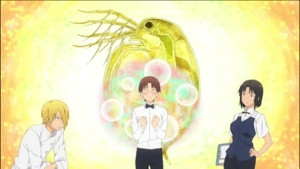
Rating: 2.5 (of 5)
Taneshima is a tiny high school girl with a lot of spirit, but due to her diminutive stature, she's not the most useful employee at the diner where she works. She needs to find a new part-timer to help her serve customers and runs right into quiet but cheery Takashima, happy to fill the position simply because he's charmed by Taneshima, who he mistakes for a small child. No no, he's not a lolicon, he's a…”minicon.” He has an innocent, protective affection for diminutive things in general: puppies, kittens, even fleas. “Taneshima is like a flea,” he explains, which only makes his coworkers more uncomfortable, but at least they trust him to work with their littlest waitress, and it looks like his stone-cold manager will have him working a lot. Little by little he learns the ins and outs of working at a diner, meeting a myriad of bizarre coworkers while keeping an eye on the impetuous Taneshima.
Riveting, isn't it?
Well, that's not fair. Almost any premise has the potential to be high entertainment if delivered well, as evidenced by the relative success of Spice and Wolf, a series with a snoozer of a base idea and a potential three seasons under its belt. Working!! is far from being as boring as it sounds, but it's nothing special either. It has a bevy of very odd characters, but has yet to do much of anything interesting with them. The most unusual thing that happens in this diner is that the manager kicks out punks who harass Taneshima and one of the waitresses carries around a sheathed katana but apart from that, I've had more enthralling days working in fast food than this. I get the feeling this little diner doesn't get enough business because a series called Working!! demands more spastic energy and less meandering dialogue gags.
It's very charming and at least the ending song is overflowing with energy, but it only has room to improve if it wants to yield real laughs instead of half-smiles. There's nothing wrong with being tame and placid, especially amongst the more offensive offerings this season, but if Working!! was a potential employee itself, I wouldn't hire it because it doesn't stand out and I just don't feel like calling it back.
Hakuouki

Rating: 3 (of 5)
Whereas Kaichou wa Maid Sama seeks to rise above its romcom brethren to some degree, Hakuouki has pretty much plopped down crisscross with all its otome buddies, flashed a smile, and asked for tea.
Young girl Chizuru has set out on a quest to find her father, and stumbled into a potential plot against the emperor. Demonic demihumans known as “failed soldiers” attack the Shinsengumi and she is kidnapped on suspicion of being in league with them. The Shinsengumi soon determine her to be innocent and tell her they are also interested in finding her father. To travel with them, however, she must disguise herself as a man so as not to disrupt the order. (This is probably a small price to pay to travel around with so many cute men.) Nothing else happens in this episode. It's just a lot of talking about historical events and beautiful scenery…and given how flat the harem in question is, they could be counted among said beautiful scenery rather than dynamic characters.
If there is one thing that sets Hakuouki apart from every reverse harem out there, it's that the boys aren't terribly…hospitable. They threaten Chizuru with death initially when they mistake her for a man, and when they discover she isn't, a few of them leeringly ask her to disrobe. Even after they revert to smiling, honorable bishounen, she is told that betraying them intentionally or otherwise will result in death. Still, this may be only surface tension to maintain a sense of urgency in a story that hasn't started yet. Apart from that, they fit perfectly into their respective stereotypes and seem to have identical hearts of gold. (We have the stoic leader, jolly tough guy, effeminate glasses-wearing charmer, energetic shota and slouchy bad boy, among others.)
Are the Shinsengumi attractive and distinct-looking? Yes. Yes they certainly are. It's a small step in the right direction for the key audience, but nothing else here works, or maybe everything is just lazy. That's not to say this show is useless. It looks great and appears to have a story to tell, but if one thing's for sure, it's that it won't be getting there very fast. In the meantime, enjoy your lovely talking heads.
Kissxsis

Rating: -5 (of 5)
After hearing a number of horror stories about this series before it had even aired (but mostly after it had) I was determined to make it through the entire episode, no matter how horrible it was. I succeeded, and all I am left with is a dull, blank stare. I refuse to even think about what I've just watched, and unlike the other embarrassing bit of dreck this season, B Gata H Kei, I can't even suggest viewing this eyesore “to see how bad it is.” There's not even any joy in its perverseness, it's just an exercise in bland discomfort.
Short version of the plot: Bland boy is in love with his automaton twin sisters, but not quite as much as they are horny for him, as they sniff his underwear and break into his locked bedroom to feel him up on a fairly regular basis. But they're the progeny of his father's second wife and not related, we are informed, so that makes it okay.
No. No it is not. This would be puerile and offensive if they were just twins who lived down the street but the fact that he thinks of them as his sisters and combines this affection with drooling lust for them is far worse. His twisted condition still pales in comparison to the unhealthily impossible feelings of his sisters, one indistinct from the other, their only defining trait being their servantile lust for their younger brother. Still, this was created for a reason, and that's the most depressing part of it all.
This is so deplorable that I wish we lived in a world where this filth had no reason to exist. The fact that it has enough of an audience to be produced and aired rather than sliming its way to DVD in OVA form (although I understand there are OVAs) gives new and upsetting insight to the low opinion the Japanese have of otaku. It wasn't the most explicit show I had ever seen. It wasn't even close. It's just the spirit behind the whole vile concept of the story that leaves a burgeoning black hole in the viewer's gut. It's that ghastly.
Angel Beats!

Rating: 4 (of 5)
Within the first six minutes of this episode, our protagonist dies three times, and it's beginning to annoy him. You see, Otonashi woke up dead today, with no memories of who he is or why he died. He's in the afterlife, which looks like a normal high school, and now death is treated like a minor inconvenience with wounds healing after a few minutes followed by a sudden revival. It's like some twisted video game, but not only for that reason. A boisterous classmate, Yuri, forces him to enlist in her resistance movement against “the Angel,” a beautiful young girl who patrols the school and erases souls from this world to be reincarnated as, she suspects, some lower life form…maybe a barnacle or a water flea. Attending classes or trying to blend in with all the normal-looking students, who she calls NPCs, not human souls, will only result in vanishment to the other side. So they fight the Angel, and seek to overthrow God himself…should he even exist at all.
This sounds a lot more exciting than it actually is, because Angel Beats' treatment of the supernatural is mundane and understated. There's no way to tell at this point whether this will be obnoxious or a brilliant choice, but at the very least, it's attention-getting. Apart from freaking out at the prospect of death (several times) Otonashi is droll and sarcastic about his fate, the only boy not bowing to the eccentric and forceful Yuri's every whim…and perhaps the only boy who can really get into her head. Yuri's armband-wearing club talks about blowing off the Angel's kneecaps, but eventually ends up snatching meal tickets from the NPCs instead, using a four-girl band as a diversion while the Angel creeps ever closer, warping space around her to form weapons and punish the naughty punks.
Four-girl band? Why a random insert song? I mean it's nice-looking, but…oh no. This is The Melancholy of Haruhi Suzumiya and Higurashi melded into one irresistible premise. It's hard to say whether Angel Beats gripping foundation will yield a great series or a pile of pandering clichés, given the presentation of this episode is slick, eyecatching and completely given over to copying popular trends, but with its lingering focus on Otonashi's greater interest in the Angel than his human comrades, there's no doubt that a second episode will be greatly anticipated. At the very least, with a palette highly reminiscent of Key's best works, it's a real looker.
Ichiban Ushiro no Daimao
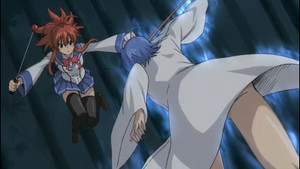
Rating: 2.5 (of 5)
In storytelling as well as video games there's a concept called “world-building.” This is of utmost importance in fantasy. Elements of the fantasy world are introduced simply, become established, and slowly build on each other to form a complex, believable world unlike any other, albeit one with elements that cannot exist in our own. It's a craft. It makes the unbelievable completely plausible. One of the crown jewels of mastery over this concept is Fullmetal Alchemist. Now take this messy mixture of science fiction, magic, religious prophecy, high school dormitory life and general cartoon hamminess that is not a comedic parody, but a generally unfunny lighthearted dramedy, and the drama will not work because the universe that has been thrown at us is completely ridiculous and has not explained itself. At the very least this show will have to construct great action scenes and riotous laughs to be worth sitting through. This has yet to be seen, but we'll give it the benefit of the doubt for now.
Akuto Sai is riding a flying space bus to magic school in training to become a high priest when he meets up with young samurai girl Hattori and they decide to share a pact as…warriors. (Let that all sink in.) After talking to a magical fate-determining device shaped like an emphysemic crow in a bottle that the school nurse calls the height of technology, Akuto is shocked to discover that his fate is to become a demon lord, not a priest, like the demon lord that terrorized the city many years ago. His efforts to prove to his student body that he is a good person through and through only backfire, and now Hattori feels betrayed by him, after their…minutes…of friendship, and swears to strike him down. (For a noble character, she sure won't give an unarmed guy the chance to defend himself. Also, for being the biggest “prude” in school, she runs around half naked an awful lot in the first episode without caring. I'd hate to see the promiscuous students!)
To be fair, as evidenced by that onslaught of nonsense, this is a fairly fun watch, but the animation and effects are just sort of okay and the humor, characters, everything is an unimpressive cliché. The only remotely remarkable part of the premise is Akuto's desperation to be a purehearted saint while the world tells him he will become a demon monster…but even this is distilled by his leering at a few panty shots and the promotional art's overt hinting that he will NOT escape his fate…or even try very hard. This is sure to satisfy a certain audience, but try as I may, I can't sympathize. Still, you'll know from this one episode whether you will love or hate this for sure.
Kaichou wa Maid-sama!

Rating: 4 (of 5)
Usually the phrase “something for the ladies,” (the chick flick,) is fairly derogatory. Ignoring the fact that male-garnered films like Death Race and Repo Men are just as painful, ladies' flicks are treated like the necessary dregs of film for stupid audiences who only watch with their mushy feelings instead of their mushy brain. Shojo gets much the same rap with titles like Miracle Train and Hanasakeru Seishounen being the flagship clunkers of the season.
Thankfully, horrible title or no, this show is NOT like the norm. It's a real treat. It might not do much for guys, depending on the dude, but with its strong female lead and instantly likable male love interest alone, it's already a winner for the female otaku. One episode to judge by or not, it appears to be hiding more than just cute characters, however. It is smartly funny and has great capacity to blossom with depth as well.
Man-hating Misaki is in charge of her co-ed high school's student body, and she will step on toes and rip out piercings to keep those smelly, insensitive creatures called men that haunt her once all-girls' school in line. Despite this strong desire to command respect, her family's unstable financial situation leaves her no choice but to work in a maid café part-time. Of course, the inevitable happens and she is discovered during her shift by a classmate: the callous, girl-dismissive Usui. He doesn't blab to the other students and he doesn't laugh at her…he just shows up to the café day after day to stare impassively at her, and it's about to drive Misaki nuts. What does he want?
That's actually a good question. Both of these characters are unique, complex, and likable. Misaki isn't a hyperactive airhead, and abandonment by her father is already a good (yet unstated) reason for her dislike of boys. Usui is an enigma, but charming in a more realistic way and that's all that's needed to make him a very attractive male lead. (That and an ending theme heavy with Usui manservice.) The episode flies by in a blend of traditional shojo humor and 1st person narration, but it's at least timed well, if not very typical of these series. Production-wise, it's nothing special, but it doesn't have the garish animation problems of the otherwise gorgeous Vampire Knight, either. It's stable, constant in both tone and appearance, and it looks to be a high-school offering with a far more mature feel. Highly recommended for fans of romantic comedy. (Everyone else, well, test the waters.)
B Gata H Kei
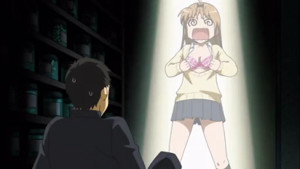
Rating: 1 (of 5)
Yamada (no first name yet, the show informs us) has but one goal for her first year of high school. To get laid! …By 100 different boys! Such a valiant pursuit, to ascend the heights of slutdom, but oh wait, there's more layers to her noble and captivating quest! She's only after virgin boys because she's afraid her muffin doesn't look terribly tasty and is positive that only fresh fish would take the bait she has to offer down south. So now her quest is to deflower (would it perhaps be dethorn?) 100 men instead! Her first target: nerdy Kosuda, who she finds unattractive but beggars can't be choosers!
Is this normal? Of course not! The concept is downright insulting to women on the whole, but is it at least funny? No, it's rancid and obnoxious for a myriad of reasons. First of all, the main character is, what a surprise, despicable. If she were consistently wild and licentious, that still might be funny, but no, she's inexperienced so she flitters between incompatible extremes. One moment, she locks an unsuspecting “cherry boy” in a closet to flash him and get him aroused so she can get a good rape in to kick off the year, the next she'll be shoving him over and fleeing in terror at the sight of a shielded stiffy. (That's the crowning gag of the episode, by the way.)
Second, we're graced with running commentary by an “erogami,” the personification of Yamada's libido, who resembles and functions like Babbitt from Kodocha except a thousand times more annoying. Even when that abomination isn't prattling away, every other character from the series pops in at random times to share such classic quips as “She's so stupid!” and “Just talk normally, Yamada!” It goes without saying that Kosuda has no traits whatsoever to distinguish him from the usual spineless male lead in these things. That might have at least improved the concept behind this trainwreck a smidgen…okay, half a smidgen.
Was this supposed to be funny even in theory? The “joke” that she was about to sex Kosuda up but forgot that kissing comes first is played off as cute, but reversing the genders on this entire premise would not be acceptable, much less funny, and this cringe-worthy “comedy” is hardly acceptable either.
Heroman
 Rating: 4 (of 5)
Rating: 4 (of 5)Central City's resident wimp, Joey Jones, likes to keep a smile on his face, and that's what makes him lovable. He's stuck working stressful shifts at a café to support his grandmother, has bully troubles and let's face it, he runs like a girl…does most everything like a girl, actually. Thankfully, if there's one thing Japanese anime and American comics have in common, it's the empowerment of the wusses in this world. After repairing a broken toy robot thrown out by one of his school bullies, (they're all the rage but he can't afford one,) and naming it Heroman, the unexpected happens. A mysterious force transforms it into an enormous patriotically colored superhero that he controls through a device grafted onto his arm. Even with Stan Lee's name (and face, catch the cameos,) attached, this sounds like a cornball idea.
Never underestimate the dexterity of Studio BONES, because thus far it's exceedingly charming. The pacing is superlative, the art is bright and beautiful, and the whole package is saturated with the innocent simplicity of a child's imagination. (Joey's discovery of and reaction to Heroman recalls memories of the enchanting film The Iron Giant and the tender subtlety in his expressions, as when he sees Lina in danger, is anything but cheesy.)
Though quite light on dialogue, the characters of Heroman are already distinct and likable, particularly by kids' show standards. Joey is reserved but kind, not squealy and obnoxious. Psy (Joey's only friend who wields a fro to shame Spike Spiegal) is cool but supportive, not always throwing off wisecracks and love interest Lina is confident but gentle, not obnoxiously perky. (She also manages to be cute as a button while sporting a completely normal figure.)
Of course there's bound to be trouble around the corner as Joey's quirky scientist chum has been sending messages into the ionosphere in the hopes of meeting aliens. The “Scrugg” that intercept his messages don't seem to be coming in peace, so whether Heroman can retain its endearing charm through hyperactive action bonanzas is yet to be seen…
Ikkitousen: Xtreme Xecutor
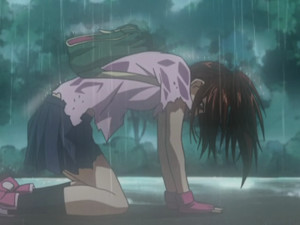 Rating: 2 (of 5)
You can tell this is the fourth season of Ikki Tousen by the six minute recap at the top of the episode. Of course, the purpose of a recap is usually to fill new viewers in to the ongoing plot, but this clunky hodgepodge of unrelated clips and quotes from previous seasons does no such thing, making itself a turnoff to newbies and completely unnecessary for present fans. It might as well not even be there, and the same could be said for Ikki Tousen on the whole, but it's cheap, safe, and has a fanbase, so here comes season four of this terrible series.
Rating: 2 (of 5)
You can tell this is the fourth season of Ikki Tousen by the six minute recap at the top of the episode. Of course, the purpose of a recap is usually to fill new viewers in to the ongoing plot, but this clunky hodgepodge of unrelated clips and quotes from previous seasons does no such thing, making itself a turnoff to newbies and completely unnecessary for present fans. It might as well not even be there, and the same could be said for Ikki Tousen on the whole, but it's cheap, safe, and has a fanbase, so here comes season four of this terrible series.The reanimation of previous scenes from the series is a strong indicator that the artistry has improved since then, which isn't saying too much, but for a show revolving entirely around fanservice, this is a step in the right direction. After the bloated recap, we are introduced to a brand new battle vixen seeking vengeance for its-not-explained-what against characters that were not prevalent in the recap either. (Was it there to eat runtime, maybe?) From the endless barrage of panty shots more detailed than some characters' faces to the constant violence-based sex “jokes,” this is the same juvenile, asinine garbage it always was. (Ripping someone's breasts off and running them up a flagpole is funny, right?)
The good news is that it's slightly more tolerable. The action scenes have a small amount of real fighting to them, sharp timing, and a twinge of creativity, instead of only awkward speedlines. Overall it's not a terrible first episode visually, which is more than can be said for the writing. It manages to entertain and maybe even titillate slightly better than expected, though it succeeds much moreso with the help of Mr. Mute Button.
discuss this in the forum (721 posts) |
this article has been modified since it was originally posted; see change history
back to The Spring 2010 Anime Preview Guide
Season Preview Guide homepage / archives